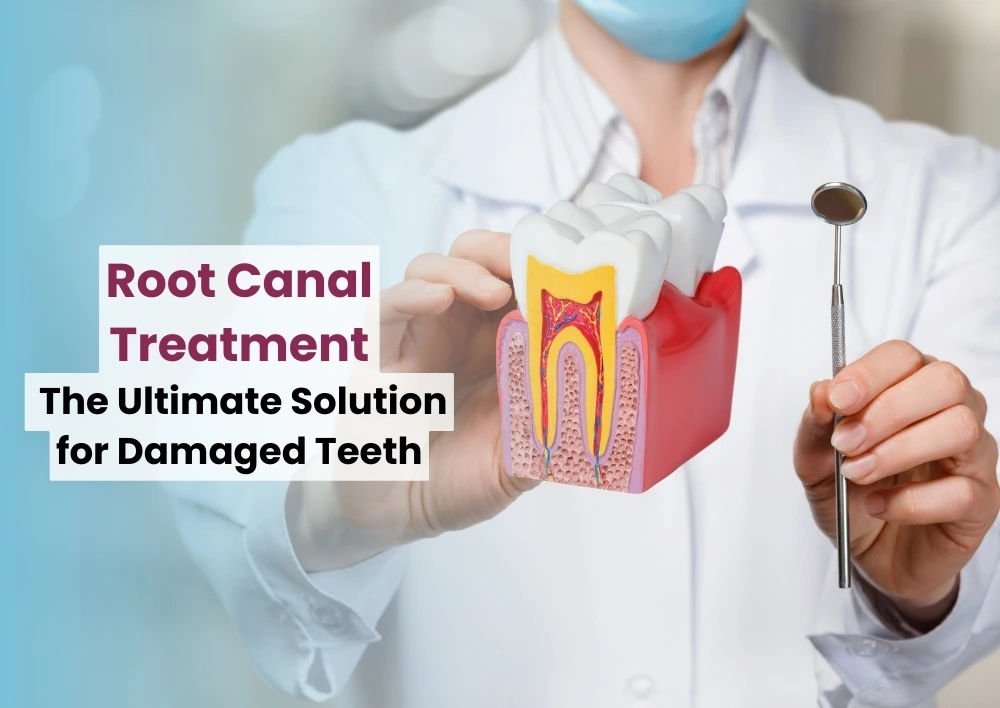Root Canal Treatment: The Ultimate Solution for Damaged Teeth
Summary: Root canal treatment for teeth is a highly effective procedure to save damaged or infected teeth, relieving pain and preventing further complications. It involves removing the infected pulp, cleaning the canals, and sealing them to restore tooth function. The procedure is generally painless with modern techniques and can be completed in one to three visits. Post-treatment care, including covering the tooth with a good quality crown, good oral hygiene and follow-up appointments, ensures long-term success.
Are you experiencing severe tooth pain, swelling, or sensitivity? The problem could be much deeper than a simple cavity. Usually, it indicates a serious issue within the pulp of the tooth, and the solution is Root Canal Treatment (RCT). It is a common procedure that can save your tooth and relieve discomfort. In this blog post, the best dentist in gurgaon at Miracles Mediclinic gives insight into what root canal treatment is, the steps involved, why it is necessary, how long it takes, post-treatment care, and the cost of the procedure.
What is Root Canal Treatment for Teeth?
Root canal treatment, usually referred to as endodontic therapy, is a dental procedure used to treat infection at the center of a tooth. The purpose of this treatment is to save a tooth that might otherwise need to be removed. It involves removing the infected or damaged pulp, cleaning the area, and sealing it to prevent future infection.
The pulp is the soft tissue inside the tooth which contains nerves and blood vessels. When it becomes infected or inflamed, it can cause severe pain and lead to further dental issues if left untreated. Root canal treatment is a highly effective procedure to address this problem and keep your natural tooth intact.
Root Canal Treatment Steps
A root canal procedure is usually done in a few simple steps. Here is the root canal treatment procedure step by step:
-
Examination and Diagnosis: The dentist will first take an X-ray to examine the area of the infection or damage in your tooth. They will also check for swelling, pain, and other symptoms to confirm whether you need a root canal.
-
Anesthesia: Local anesthesia will be applied to numb the area surrounding the infected tooth. This ensures that you won’t feel pain during the procedure.
-
Access Opening: The dentist will drill a small hole into the top of the tooth to access the pulp chamber, where the nerves and blood vessels are located.
-
Cleaning the Root Canals: The infected pulp is carefully removed. The dentist will clean and shape the empty canals to ensure there are no bacteria or debris left behind.
-
Sealing the Canals: Once cleaned, the canals are shaped using sequential files with rotary endo-motors and filled with a rubber-like material called gutta-percha. This seals the canals and prevents further infection.
-
Restoring the Tooth: After the root canal is sealed, the tooth is generally restored with a crown to protect it and restore its function. In some cases, a dental filling may be sufficient depending on case to case.
-
Final Check-Up: A follow-up appointment is necessary to ensure that the infection is completely gone and that the tooth is healing properly.
Why is Root Canal Treatment Done?
Root canal treatment is necessary when the pulp of a tooth becomes infected or damaged due to trauma, decay, or repeated dental procedures. Some of the common reasons why a root canal might be required include:
-
Severe Tooth Pain: Deep, throbbing pain, especially when chewing or applying pressure.
-
Infection or Abscess: If the infection reaches the root of the tooth, an abscess may form, causing swelling and pus.
-
Sensitivity: Persistent tooth sensitivity to hot or cold, even after the stimulus is removed.
-
Swelling and Tender Gums: Swelling near the affected tooth, often accompanied by tenderness and redness in the gums.
-
Darkening of the Tooth: A tooth that becomes darker or discolored due to pulp damage often seen in cases of trauma or fall.
If left untreated, an infected tooth can lead to serious health issues such as tooth loss, bone loss, or the spread of infection to other parts of the body. Root canal treatment is an important option for saving a tooth from extraction and preventing further complications.
Root Canal Treatment Duration
Root canal treatment can take anywhere from one to three visits to complete, depending on the complexity of the infection and the tooth involved. The procedure typically takes 30 to 40 minutes per session, though more complicated cases may require additional time.
For a straightforward case, a single visit may be sufficient, especially for front teeth with fewer root canals. However, molars usually have multiple roots and may require multiple visits to ensure thorough cleaning and sealing of the root canals.
After the root canal procedure is complete, a crown is placed to protect the tooth and restore its function, which might require an additional visit. Placing a crown increases the chewing efficiency and prevents the possibility of fracture of treated teeth along with a decreasing chance of re-infection.
How to Take Care of Teeth After Root Canal Treatment?
Post-treatment care is important for ensuring the success of the root canal and protecting your tooth from further complications. Here are a few tips on how to care for your teeth after a root canal:
-
Avoid Chewing on the Treated Tooth: For the first few days, avoid chewing on the side of the treated tooth, especially if it has not yet been fully restored with a crown or filling.
-
Follow Dentist's Instructions: Your dentist may prescribe pain medication or antibiotics to prevent infection. Be sure to follow their instructions carefully.
-
Pain Management: It is normal to experience some discomfort after the procedure. Over-the-counter (OTC) pain relievers can help manage any soreness.
-
Practice Good Oral Hygiene: Brush and floss your teeth regularly, but be gentle around the treated tooth. Keeping the area clean will help prevent infection.
-
Attend Follow-Up Appointments: Be sure to attend any follow-up appointments to check on the healing process and make sure the infection is gone.
If you experience any signs of infection, such as increased pain, swelling, or discharge, contact your dentist immediately.
Benefits of Root Canal Treatment
Root canal treatment offers several advantages, making it a preferred choice for treating infected teeth:
-
Pain Relief: Root canals eliminate the source of pain by removing infected tissue and preventing the further spread of the infection.
-
Tooth Preservation: Instead of extracting the tooth, root canal treatment saves the natural tooth, which is always the best option for long-term oral health.
-
Restored Functionality: After the treatment, the tooth is restored with a crown, allowing you to chew and bite as usual.
-
Preventing Future Infections: Sealing the tooth effectively reduces the risk of future infections.
Myths About Root Canal Treatment
There are several misconceptions about root canals that can make patients hesitant to undergo the procedure including:
-
Myth 1: Root canals are extremely painful.
-
Fact: With modern anesthesia and advancements in dental technology, root canal treatments are generally no more painful than getting a routine filling.
-
Myth 2: Root canals are expensive and not worth it.
-
Fact: While the cost of a root canal can vary depending on the tooth's complexity, it is usually much more cost-effective than extracting the tooth and replacing it with a bridge or implant.
How Much Does Root Canal Treatment Cost?
The cost of root canal treatment can vary based on several factors, such as the location of the tooth, the complexity of the case, and the dentist’s experience. Additional costs may include X-rays, medication, and crowns to restore the tooth after treatment.
Conclusion:
Root canal treatment is an effective way to save a damaged or infected tooth, eliminating pain and preventing further dental issues. By following the proper care steps after treatment and working closely with your dentist, you can keep your teeth healthy and intact for years to come.
If you are experiencing symptoms that may require root canal treatment or have questions about the procedure, consult the best dentist near you at Miracles Healthcare. We are here to ensure you receive the best care possible to keep your smile healthy and bright. Contact us today to schedule an appointment and ensure the health of your teeth!
Frequently Asked Questions
With modern anesthesia, a root canal is usually no more painful than a regular filling.
A properly done root canal can last 10 to 15 years or even more with good oral hygiene.
You may need a root canal if you have severe tooth pain, sensitivity to hot or cold, or an infected or decayed tooth.
Yes, but wait until the numbness wears off and stick to soft foods for the first 24 hours.
RCT (Root Canal Treatment) is generally painless during the procedure and causes only mild discomfort afterward.
Yes, It is a safe and effective procedure to save a damaged or infected tooth.
At Miracles Mediclinic Gurgaon, we have a team of highly experienced dentists who use advanced techniques to ensure comfortable and successful root canal treatments.















Was the information useful?
1 0